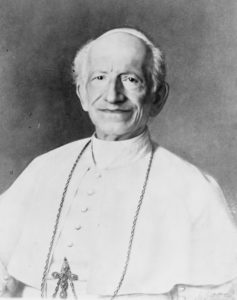The popular view is that religion should adapt to the times. The unpopular view is that the times should adapt to religion. This is the central issue confronting the Catholic Church right now, but I suspect the tensions have existed above or beneath the surface in all faiths throughout time.

G.K. Chesterton observed that while many view the Catholic Church as extreme, it is really the epitome of moderation, in the sense that its dogma pulls culture back to the center from wherever it happens to be at the moment. In times of extreme social liberality, it is the conservative aspects of dogma that attract; in times of extreme conservatism, it is the reverse. For instance when Industrial Revolution was in full tilt, Pope Leo XIII issued his encyclical Rerum Novarum, which spoke to the importance of just working conditions. Later, when the culture had shifted full tilt into sexual license, Pope Paul VI issued his encyclical Humanae Vitae, emphasizing the importance of sexual restraint.
I think Chesterton is correct. Dogma — unchangeable teachings, foundational articles of faith — pull us back from extremes. When we are extremely negligent of working conditions, dogma reminds us in extremely strong fashion why and how this leads us astray. When we are extremely negligent of sexual responsibility, dogma reminds us why and how this leads us astray. The teachings don’t change, but the emphasis changes in our day to day life based on what internal and external pressures are pushing us away from those teachings.
If a religion changes its teachings to “suit the times,” it is really abandoning its purpose. If religious teachings follow the culture, then why does one need those teachings? It would be more efficient for us to “cut out the middleman” and take our moral cues from the culture directly. This is, in fact, what many people do, consciously or unconsciously, religious or irreligious.
The problem with trying to live in sync with cultural norms is that those norms are always changing. Instead of helping us to achieve spiritual growth or even spiritual stability, chasing culture is like chasing one’s tail; we run around in circles, exhausting and frustrating ourselves as we go round and round.
Much more promising is to have a fixed point of dogma, a spiritual constant, by which one can accurately measure the distance between where his soul is and where it should be. If I’m doing wrong I need to know it; I want to be corrected, guided, counseled, improved. The last thing I want is to be curried favor with by a religion that glosses over popular sins or over all sins altogether. And, if I do happen to be doing something right, a little confirmation, a dogmatic pep talk, would do me plenty of good as well.
Some people can take dogma on faith; others (like me) can only accept it after much studying and pondering. To cite Chesterton on dogma again:
“Merely having an open mind is nothing. The object of opening the mind, as of opening the mouth, is to shut it again on something solid.” — G.K. Chesterton
Although this point of view some find hard to digest, it is really the only way to taste the best fruits of life.
(Image Credit – Wikimedia Commons)

Berrmot, good post! Living in a “everything is relative” world is both confusing and exhausting.
Thank you, Bill. Your are certainly right about that.
I couldn’t agree more and have nothing to add. Excellent!
Thank you, Greg.